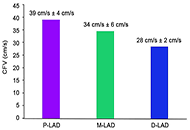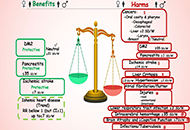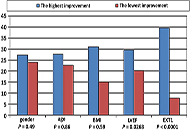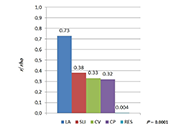Alcohol zero: the end, the beginning of the end, or just the end of the beginning?
Alcohol drinks, especially wine, have been described since 6,000 B.C. For many years in modern medicine, wine in moderation has been considered healthy for cardiovascular prevention, i.e., recommend
[...] Read more.
Alcohol drinks, especially wine, have been described since 6,000 B.C. For many years in modern medicine, wine in moderation has been considered healthy for cardiovascular prevention, i.e., recommended by nutrition committees. Some regional guidelines still recommend one to two standard drinks per day. By the very recent (January 2023), World Health Organization and Canadian Guidance on alcohol emphasize that any alcoholic drink is hazardous to the health and the safe amount is zero. The risk starts with every single drop. It was also nicely summarized in the manuscript “Alcohol-dose question and the weakest link in a chemical interplay” (Explor Cardiol. 2023;1:15–25. doi: 10.37349/ec.2023.00003) especially from the standpoint of a researcher in the cardiovascular arena. The newest recommendations are based on observational studies and their meta-analysis, therefore establishing associations, pointing out that alcohol may somewhat prevent cardiovascular diseases and diabetes type 2, but with a significant increase in non-cardiovascular morbidity and mortality, especially cancers. Previous recommendations, therefore, may be obsolete as they were based on studies where abstainers from alcoholic beverages had inherent higher risks. The current controversy with conflicting guidelines for alcoholic beverage consumption in the era of precision medicine may stimulate more fundamental investigations up to genetic ones and find the cause-effect relations. In the era of precision medicine, it may come closer to discovering the causes of cancers and many other diseases, enabling predictions of reactions to alcoholic beverages by each person, not just in the population.
Miodrag Ostojic ... Dusko Vulic
View:922
Download:17
Times Cited: 0
Alcohol drinks, especially wine, have been described since 6,000 B.C. For many years in modern medicine, wine in moderation has been considered healthy for cardiovascular prevention, i.e., recommended by nutrition committees. Some regional guidelines still recommend one to two standard drinks per day. By the very recent (January 2023), World Health Organization and Canadian Guidance on alcohol emphasize that any alcoholic drink is hazardous to the health and the safe amount is zero. The risk starts with every single drop. It was also nicely summarized in the manuscript “Alcohol-dose question and the weakest link in a chemical interplay” (Explor Cardiol. 2023;1:15–25. doi: 10.37349/ec.2023.00003) especially from the standpoint of a researcher in the cardiovascular arena. The newest recommendations are based on observational studies and their meta-analysis, therefore establishing associations, pointing out that alcohol may somewhat prevent cardiovascular diseases and diabetes type 2, but with a significant increase in non-cardiovascular morbidity and mortality, especially cancers. Previous recommendations, therefore, may be obsolete as they were based on studies where abstainers from alcoholic beverages had inherent higher risks. The current controversy with conflicting guidelines for alcoholic beverage consumption in the era of precision medicine may stimulate more fundamental investigations up to genetic ones and find the cause-effect relations. In the era of precision medicine, it may come closer to discovering the causes of cancers and many other diseases, enabling predictions of reactions to alcoholic beverages by each person, not just in the population.
 Normal physiologic coronary flow velocity gradient across the left anterior descending artery in healthy asymptomatic subjectsOpen AccessOriginal ArticleAim: Coronary flow velocity (CFV) can be obtained with transthoracic echocardiography (TTE) in the left anterior descending coronary artery (LAD). The physiologic flow velocity gradient across th [...] Read more.Fausto Rigo ... Maurizio AgnolettoPublished: August 31, 2023 Explor Cardiol. 2023;1:42–48
Normal physiologic coronary flow velocity gradient across the left anterior descending artery in healthy asymptomatic subjectsOpen AccessOriginal ArticleAim: Coronary flow velocity (CFV) can be obtained with transthoracic echocardiography (TTE) in the left anterior descending coronary artery (LAD). The physiologic flow velocity gradient across th [...] Read more.Fausto Rigo ... Maurizio AgnolettoPublished: August 31, 2023 Explor Cardiol. 2023;1:42–48 Alcohol zero: the end, the beginning of the end, or just the end of the beginning?Open AccessPerspectiveAlcohol drinks, especially wine, have been described since 6,000 B.C. For many years in modern medicine, wine in moderation has been considered healthy for cardiovascular prevention, i.e., recommend [...] Read more.Miodrag Ostojic ... Dusko VulicPublished: August 31, 2023 Explor Cardiol. 2023;1:35–41
Alcohol zero: the end, the beginning of the end, or just the end of the beginning?Open AccessPerspectiveAlcohol drinks, especially wine, have been described since 6,000 B.C. For many years in modern medicine, wine in moderation has been considered healthy for cardiovascular prevention, i.e., recommend [...] Read more.Miodrag Ostojic ... Dusko VulicPublished: August 31, 2023 Explor Cardiol. 2023;1:35–41 Left ventricular systolic function and initial exercise capacity—their importance for results of cardiac rehabilitation after acute coronary syndromeOpen AccessOriginal ArticleAim: The aim of this study was to compare initial and final exercise tolerance and to evaluate the determinants of exercise capacity improvement—after three weeks of inpatient cardiac rehabilit [...] Read more.Barbara Uznańska-Loch ... Tomasz RechcińskiPublished: August 30, 2023 Explor Cardiol. 2023;1:26–34
Left ventricular systolic function and initial exercise capacity—their importance for results of cardiac rehabilitation after acute coronary syndromeOpen AccessOriginal ArticleAim: The aim of this study was to compare initial and final exercise tolerance and to evaluate the determinants of exercise capacity improvement—after three weeks of inpatient cardiac rehabilit [...] Read more.Barbara Uznańska-Loch ... Tomasz RechcińskiPublished: August 30, 2023 Explor Cardiol. 2023;1:26–34 Alcohol—dose question and the weakest link in a chemical interplayOpen AccessReviewThe deleterious consequences of alcohol consumption are extensively documented across various dimensions of human health, encompassing somatic disorders such as nervous system impairments, digestive [...] Read more.Piotr Hamala, Karina Wierzbowska-DrabikPublished: August 18, 2023 Explor Cardiol. 2023;1:15–25
Alcohol—dose question and the weakest link in a chemical interplayOpen AccessReviewThe deleterious consequences of alcohol consumption are extensively documented across various dimensions of human health, encompassing somatic disorders such as nervous system impairments, digestive [...] Read more.Piotr Hamala, Karina Wierzbowska-DrabikPublished: August 18, 2023 Explor Cardiol. 2023;1:15–25 In search of heart barometer—advantage of left atrial dimension over electrocardiographic indices of left ventricular hypertrophy in arterial hypertensionOpen AccessOriginal ArticleAim: Left ventricular (LV) hypertrophy (LVH) is a common and relevant complication of arterial hypertension (AH) and 12-lead electrocardiogram (ECG) is widely used for its preliminary assessment. [...] Read more.Bogusława Nowak ... Karina Wierzbowska-DrabikPublished: July 14, 2023 Explor Cardiol. 2023;1:4–14
In search of heart barometer—advantage of left atrial dimension over electrocardiographic indices of left ventricular hypertrophy in arterial hypertensionOpen AccessOriginal ArticleAim: Left ventricular (LV) hypertrophy (LVH) is a common and relevant complication of arterial hypertension (AH) and 12-lead electrocardiogram (ECG) is widely used for its preliminary assessment. [...] Read more.Bogusława Nowak ... Karina Wierzbowska-DrabikPublished: July 14, 2023 Explor Cardiol. 2023;1:4–14 Exploration of Cardiology: a new journal is bornOpen AccessEditorialEugenio PicanoPublished: July 01, 2023 Explor Cardiol. 2023;1:1–3
Exploration of Cardiology: a new journal is bornOpen AccessEditorialEugenio PicanoPublished: July 01, 2023 Explor Cardiol. 2023;1:1–3